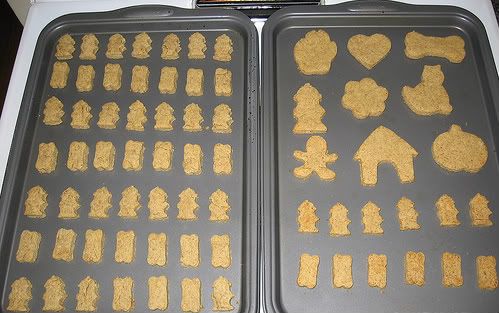Above: Homemade Pet Treats
Pet treats are something people are sharing more and more with their pets and this week I got to pondering about the line between responsible pet parenting and indulgent pet parenting.
When it comes to obese pets, treats are not the problem but the type of pet parent you are might be.
For instance, I was walking with a neighbor whose dog suffers from hip dysplasia.
The dog is just over a year old and looks like a sausage.
She waddles down the road and can barely walk about a half a block before she has to rest.
The owner told me, “She only gets a half a cup of food a day but I can’t get her to lose weight.”
Now me, the professional, automatically went into assessment mode and my first thought was that the dog also had a metabolic disorder of some sort.
But suddenly I got an intuitive hunch and so asked, “How many treats does she get a day?”
My neighbor startled and looked up at me much like I image a deer looks into oncoming headlights.
I broke into laughter and said, “Oh, you are so busted.”
She wasn’t a client and so I left it at that since she has no idea about my background or expertise.
Fortunately, her conscience got the best of her and I soon learned that the dog was restricted on receiving treats and I actually began to see a waist begin to appear.
For some reason people don’t equate treats as daily caloric additives.
They are called “cookies” for a reason.
Now I’ve written about pet obesity before and am sad to say that over 40% of pet households contain animals that are overweight.
When an animal is obese it means the animal is in danger from increased risk of disease, shorter life span, and other complications.
So you would think people would be diligent when it comes to their animals–but it isn’t necessarily so!
For instance, I know an animal rescue gal whose dog was seriously obese.
She got a cookie for every little thing and when she contracted diabetes, the owner still indulged her with treats.
Needless to say the dog died way to early.
Personally, I am just a bit more selfish and am on the opposite side of the spectrum–probably an overly responsible pet parent.
When my dog’s waist was not visible, the exercise was increased and his rations were limited.
He wasn’t deprived, just managed.
Now, if you are a indulgent pet parent, you need to get into school and learn how you can spoil your pet without ruining their life.
Just yesterday I met with a pet parent who believes his terrier was happy and content.
The dog wasn’t. In fact, he was extremely overweight and acting out by grabbing every morsel in sight.
Setting limits isn’t cruel, it is kind and makes an animal more secure.
If you are seeking to bond with an animal, it isn’t done through treats.
It is done in how you interact and live with an animal.
So how do you tell if a pet is overweight?
You cannot identify the waist when you look down upon the animal’s back.
To immediately reduce the intake of the animal, simply break all treats into flavor burst size.
Something the size of a corn kernel is best because it gives the animal a big burst but not the calories.
Another strategy to try is to change to treats that have reduced calories and more fiber.
Or you could reduce the meal intake to adjust for treats and snacks.
So I wonder, are you a responsible pet parent or an indulgent pet parent?
Confess below in the comments or over in my Facebook community…and for those who need to amend your evil ways, sign up for the early bird announcement for the Pet Parenting School!
Photo Credit: Vegan Flower



